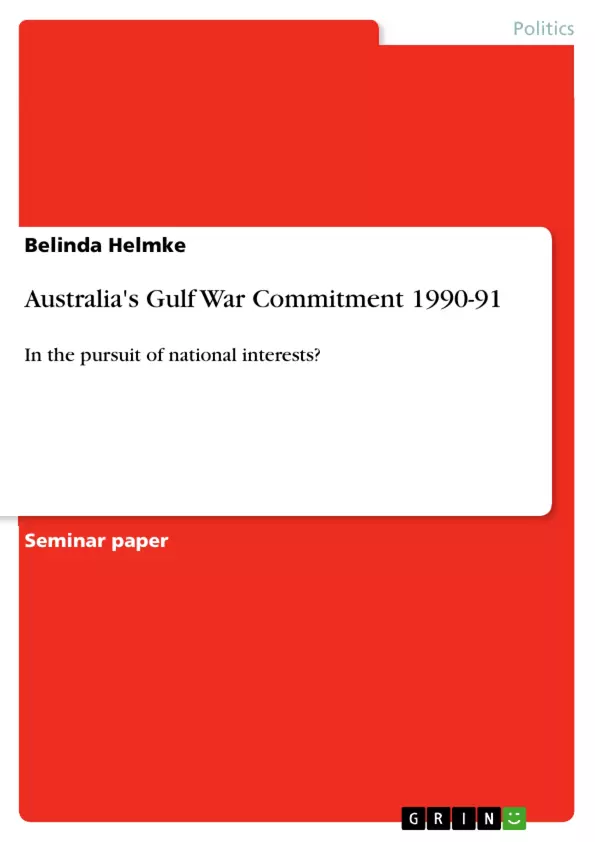When the Australian Labor government announced the deployment of a naval contingent to the Persian Gulf on the 10th August 1990, Prime Minister Bob Hawke described the commitment as being ”proportionate to the interests we have at stake” . What Hawke refers to in his statement is the importance of national interests in the formulation of foreign policy and a country’s reaction to world events such as Iraq’s invasion of Kuwait.
This paper will analyse to which extent the Prime Minister’s claim to have acted in and proportionate to the national interest is true. In order to be in a position to answer this question, one has to agree on a definition of the term ”national interest”.
Inhaltsverzeichnis (Table of Contents)
- Redefining Australia's security interests
- Strategic Interests
- Economic and Trade Interests
- Good International Citizenship
- 'So that no other bastard takes over the trade'
Zielsetzung und Themenschwerpunkte (Objectives and Key Themes)
This paper aims to analyze the Australian Labor government's decision to deploy a naval contingent to the Persian Gulf during the 1990-91 Gulf War. It examines the extent to which the Prime Minister's claim that the commitment was “proportionate to the interests we have at stake” was justified. The paper will analyze the concept of "national interest" as defined by the Australian government at the time and assess the role of strategic, economic, and international citizenship interests in shaping Australia's involvement.
- The concept of national interest and its definition within the Australian context
- The interplay of strategic, economic, and international citizenship interests in Australian foreign policy
- The influence of the United States and international political economy on Australia's decision-making
- The balance between national and personal interests in political decision-making
- The impact of the Gulf War on Australia's security and economic interests
Zusammenfassung der Kapitel (Chapter Summaries)
The first section of the paper will focus on the redefinition of Australia's security interests in the post-Cold War era. It will analyze how the Gulf War challenged Australia's traditional policy of continental defence and the emergence of new strategic interests in the Middle East. This section will also explore the significance of economic and trade interests for Australia, particularly with regard to the Gulf States and the importance of maintaining access to crucial export markets.
The second part of the paper delves into the economic and trade interests at stake in the Gulf Crisis. The author argues that the Australian government's decision to support sanctions and war against Iraq was driven by a combination of factors, including the desire to protect its own economic interests and its dependence on major trading partners who relied heavily on Middle Eastern oil reserves. The paper will illustrate how Australia's economic interests were intertwined with the international political economy, creating a complex web of interconnected considerations that ultimately shaped the government's decision.
Schlüsselwörter (Keywords)
The key themes of this paper revolve around national interests, strategic interests, economic interests, international citizenship, foreign policy, the Gulf War, the United States, Australia's security, and the international political economy. The paper will critically examine the Australian Labor government's decision to engage in the Gulf War, analyzing the interplay of different national interests and exploring the extent to which the government's actions were truly guided by the well-being of the nation and its citizens.
Frequently Asked Questions about Australia's Gulf War Commitment
Why did Australia commit naval forces to the Gulf War in 1990?
The commitment was described by Prime Minister Bob Hawke as being proportionate to Australia's national interests, including strategic and economic concerns.
How is "national interest" defined in this context?
National interest includes strategic security, economic and trade stability, and the concept of "good international citizenship."
What were Australia's economic interests in the Persian Gulf?
Australia aimed to protect export markets in the Gulf States and ensure global oil price stability, which affected its major trading partners.
Did the US influence Australia's decision?
The paper analyzes how Australia's alliance with the US and the international political economy played a significant role in its foreign policy choices.
What changed in Australia's security policy after the Cold War?
The Gulf War challenged the traditional policy of continental defense, leading to a redefinition of security interests in a globalized world.
- Quote paper
- Dr. Belinda Helmke (Author), 2002, Australia's Gulf War Commitment 1990-91, Munich, GRIN Verlag, https://www.grin.com/document/174529



